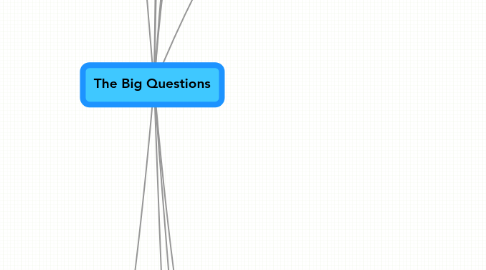
1. Doing Philosophy
1.1. Problems with buzzwords and their solution
1.1.1. Truth
1.1.1.1. Articulation
1.1.2. Justice
1.1.2.1. Arguement
1.1.2.1.1. These give rise to concepts that have to fall into a conceptional framework.
1.1.3. Freedom
1.1.3.1. Analysis
1.1.4. Moral
1.1.4.1. Synthesis
2. God chapter
2.1. Without God all would be absurd..... Kierkengaard
2.1.1. No Meaning = absurdity and nihilism
2.1.1.1. Camus
2.2. The vocabulary is useful
2.3. Spinoza ... God is everywhere
2.4. Hegel Team Spirit for Humanity
2.5. Voltaire ... God the physicist
2.5.1. Pierre Simon de Laplace ..."So what's the point Voltaire?"
2.6. Soren Kierkegaard ... God is everything
2.7. The Problem of Evil
2.8. Yes, there is evil, but it could be worse
2.9. Evil doesn't disprove God
2.10. Free will Solution
2.11. Ontological Argument in favor of God
2.11.1. But there is the problem of the flying spaghetti monster.
2.12. Kant - If there is no God, then there is no moral foundation
2.13. Pascal's Wager
2.14. Irrational Faith
2.15. Mysticism - can't be argued on the basis of faith
2.16. Marx (Opiate), Freud (Illusion)
2.17. Job (A-Yub - in Arabic) - Justice in the afterlife
2.18. Saint Thomas Aquinas - Cosmological Argument
2.19. Rush Limbaugh
3. A Little Logic
3.1. Arguments
3.1.1. Vicious and nasty
3.1.2. Logical and reasonable
3.1.2.1. Deductive argument
3.1.2.2. Inductive argument
3.1.3. Ad hominin
3.1.4. Possible Lessons
4. Opening Questions
4.1. Distribute questions to groups for discussion
5. The Meaning of Life
5.1. Vanity
5.2. Meaningless question
5.3. Children
5.4. The Afterlife
5.4.1. Why would the next life be any more meaningful that this life?
5.5. Life is a game
5.6. Desires life all about chasing the latest model telephone?
5.7. Nirvana
5.8. Is pushing a rock up a hill any different?
6. The Good Life
6.1. Kant's Good Will
6.1.1. There must be free will otherwise there can be no morality.
6.1.2. Good intentions are good enough because we are unaware of the consequences of our actions. Intentions matter
6.1.2.1. This was "duty" doing what you ought to do.
6.2. Hedonism
6.2.1. Does not exist in pure form
6.3. Epicurus
6.3.1. Happiness should be obtained, but from sober thought and reflection
6.4. Aristotle
6.4.1. Happiness
6.4.1.1. The point of success is not to arrive
6.4.1.1.1. Doing something for the sake of doing it is what happiness is.
6.4.1.2. Achieved Through Virtue
6.4.1.2.1. Courage, Temperance Liberality, Magnificence, Pride, Good temper, friendliness, Truthfulness, Wittiness, Shame, Justice
6.5. Ascetism
6.5.1. Life through simplicity and a meager living
6.5.2. Leads to purification
6.6. Friendship
6.6.1. Confucius
6.7. Psychological egoism
6.7.1. Can this exist?
6.8. Ethical Altruism
6.8.1. Golden Rule
6.9. Psychological Altruism
6.10. Ethical Egoism
6.10.1. Ayn Rand
6.11. Morality and Theories of Morality
6.11.1. Categorical imperatives
6.11.1.1. Act only on that maxim [intention] whereby you can at the same time will that it should become a universal law
6.11.1.2. Act as if the maxim of your action were to cecome by your will a universal law of nature.
6.11.1.3. Always act so as to treat humanity, whether in yourself or in others, as an end in itself, never merely as a means.
6.11.1.4. Always act as if to bring about, and as a member of, a Kingdom of Ends {an ideal community in which everyone is always moral].
6.11.2. The Rule of Deference
6.12. The Utility Principle
6.12.1. John Stuart Mill
6.12.2. Jeremy Bentham
6.13. Moral Relativism
6.14. Moral Absolutism
6.14.1. Never acceptable in any circumstance
6.15. Nietzsche-
6.15.1. "God is Dead"
6.16. New Node
6.16.1. New Node
7. The Nature of Reality
7.1. Scientists have taken over from the religious people in regards to determining what science is.
7.1.1. sdfgsdf
7.2. Ontology - Ontological study, determining what is most real.
7.3. Aristotle's false belief about weight and free fall - dispelled by Galileo
7.4. Thales - everything is water or a combination thereof
7.5. Pythagoras - Numbers are most real
7.5.1. The World Really Isn't Real
7.6. Immaterialists
7.7. Plato's Form
7.7.1. It is impossible to draw a perfect triangle
7.8. Aristotle
7.8.1. Substance is what is important
7.9. Idealists
7.9.1. Descartes - Dualism - mind body Relationship
7.9.2. Spinoza - Monist - there is only one substance
7.10. Leibniz
7.10.1. Monads
7.10.1.1. Life is immaterial and illusiionary
7.11. Idealism
7.11.1. Reality NEEDS a basis in the mind
7.12. Bishop Berkeley
7.13. German Idealists
7.14. Teleology
7.14.1. The world is a process and devoid of permanent substances. For example, what is the true nature of an apple, is it how we see it at the moment, or is it what we saw three weeks previously when it was a bud.
7.15. The problem with the process
7.16. A Decent definition of reality:
7.17. Maybe there are other dimensions we are unaware of.
7.18. Schopenhauser the Pessimist
8. Self
8.1. The Essential Self
8.1.1. Often thought of as the self devoid of what role you might be playing
8.1.2. Changes from situation to situation
8.2. Self as Body, Self as Consciousness
8.2.1. New node
8.3. The Self and it's Emotions
8.4. The Egocentric Predicament
8.5. The Mind Body Problem
8.6. Behaviorism
8.7. Identity Theory
8.8. The Self as a Choice
8.9. No Self, Many Selves
8.10. The Self as Social
8.11. Self and Relationships
8.11.1. New node
